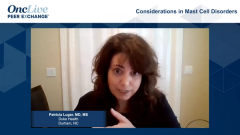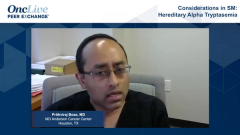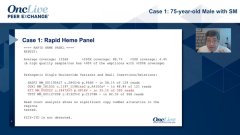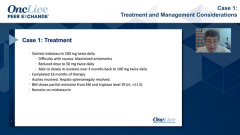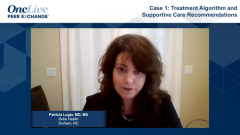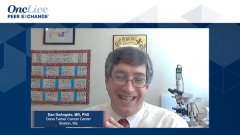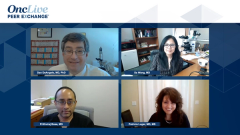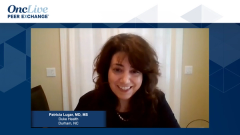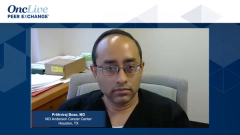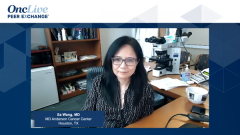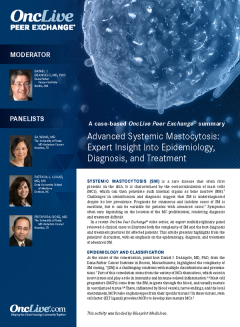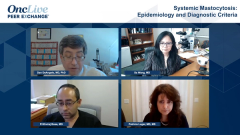
Considerations in SM: Hereditary Alpha Tryptasemia
Prithviraj Bose, MD, and Patricia Lugar, MD, MS, discuss the considerations and testing options for hereditary alpha tryptasemia in patients with systemic mastocytosis.
Episodes in this series

Dan DeAngelo, MD, PhD: Concerning this newer entity of hereditary alpha tryptasemia, or HAT, how does this play into your algorithm?
Patricia Lugar, MD, MS: We have a few patients we follow in the clinic who meet the criteria for familial alpha hypertryptasemia. Those patients are somewhat easier to care for. Their symptoms are objective, which sometimes can be very helpful because we already know we’re dealing with a mast cell disorder. We try to tease that out when we take that complete history and really look to see if these symptoms occur on an ongoing basis, particularly chronic urticaria, angioedema, and flushing. There’s that familial tendency, so if another family member has experienced it, the tryptase will be helpful to sort that out or other mast cell disorders. Folks with mast cell–activating disorders or mast cell activation syndrome frequently have a normal tryptase. That can be a good place to separate the line with, “How am I going to do my patient education and my work-up from here?” It’s tricky, but it does seem that with true mast cell disorders, you’re going to have physical symptomatology that’s very objective. It will clear to see if there’s a response, and that helps me a lot to put them into 1 bucket or the other concerning where I’m going to go next with their symptoms.
Dan DeAngelo, MD, PhD: Thank you. Dr Wong and Dr Bose, are you guys checking for hereditary alpha-1 tryptasemia in your institution? We don’t have a test in our institution. For us, it’s a send-out, but this does incur a cost to the patient. I’m not sure what you guys are doing at your institution and whether it’s helpful.
Prithviraj Bose, MD: We’re not. Of course, 1 of the limitations we have as a pure cancer center The University of Texas MD Anderson Cancer Center is that we don’t have an allergy group. That’s a limitation. So far, we’ve tried to screen the referrals that we get and see if they seem to be SM [systemic mastocytosis]. We’ve haven’t been seeing the M [mastocytosis] cases and perhaps the HATS [hereditary alpha tryptasemia syndrome].
Dan DeAngelo, MD, PhD: Dr Wang, anything else to add?
Sa Wang, MD: I agree. We’re a cancer center. That’s 1 of our limitations.
Dan DeAngelo, MD, PhD: We’re a cancer center too [Dana-Farber Cancer Center], but we’re embedded into a general hospital, so that’s probably where the referral patterns are different.
Before we move on to the cases, I want to summarize. As you’re hearing from the 4 of us, this isn’t an easy landscape to toil. These are complex patients and they’re rare, so you’re not going to see a lot of them. It’s important to note some take-home messages from the cutaneous presentations. In thinking about systemic disease—or as Dr Lugar said, patients with these recurrent anaphylactic reactions—I think about whether there’s a clonal or systemic disease. Dr. Bose and I are more cancer doctors. That’s where my interest lies. But the treatment of these patients can be difficult. As Dr Wang outlined, it’s all in the histopathology and trying to make a definitive diagnosis, both from a molecular perspective, as well as from a histopathologic perspective. These are not trivial cases. We’ve tried to outline mast cell involvement and non–bone marrow tissues. If you don’t think about it, the pathologist isn’t going to do their work for you. You’ve really got to help the pathologist out. That’s where the interaction is so important, to talk to the pathologist or your referring physicians.
Transcript Edited for Clarity


